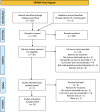Teaching trauma-informed care in undergraduate medical education: A scoping review
- PMID: 40646548
- PMCID: PMC12247427
- DOI: 10.1186/s12913-025-13086-w
Teaching trauma-informed care in undergraduate medical education: A scoping review
Abstract
Background: Experiencing trauma can affect health and wellbeing throughout the lifespan. Trauma-informed care is a framework that addresses the impact of trauma and promotes treatment approaches sensitive to this lived experience. In response to emerging awareness about trauma-informed care, educators are beginning to adapt undergraduate medical education (UME) to include content about using a trauma-informed approach when caring for patients. In 2023, leaders in the field of trauma-informed care developed a core set of competencies that institutions can use to guide their curricula in this area. This scoping review aggregated and synthesized studies evaluating trauma-informed care curricula in medical schools to examine the efficacy of different pedagogical approaches. It also mapped how these approaches align with the recently developed trauma-informed competencies for UME.
Methods: A comprehensive search strategy was used to search seven databases for articles related to teaching trauma-informed care principles to undergraduate medical students. Articles were included only if the curricula had been implemented and evaluated. A total of 233 articles were retrieved. Independent coders used a two-tier process to determine which papers met inclusion criteria. The coders extracted key information from the studies focused on training facilitators, participants, curriculum content, teaching methods, learner outcomes, and competencies.
Results: Fifteen papers were included in this scoping review, and several common themes emerged among the studies. Most trainings were brief (median 3.5 h) and taught by a multidisciplinary team. All trainings incorporated didactic components. Most also gave the trainees opportunities to apply and practice their knowledge through role playing, simulations, or patient interviews. All studies included a qualitative evaluation component, with most also having a quantitative component. Most studies reported that students acquired more knowledge and confidence in implementing trauma-informed care following the trainings. However, only two included a longitudinal follow-up component in their evaluation.
Conclusions: Trauma-informed care is beginning to be implemented in undergraduate medical education. Brief trainings in this area can increase future providers' abilities to understand how trauma affects patients and to work in appropriate ways with patients who have experienced trauma. The literature in this review can be used to guide educators seeking to incorporate trauma-informed care into undergraduate medical curricula.
Keywords: Competencies; Competency-based; Medical education; Scoping review; Trauma-informed care.
© 2025. The Author(s).
Conflict of interest statement
Declarations. Ethics approval and consent to participate: Not applicable. Consent for publication: Not applicable. Competing interests: The authors declare no competing interests.
References
-
- Hamby S, Elm JH, Howell KH, Merrick MT. Recognizing the cumulative burden of childhood adversities transforms science and practice for trauma and resilience. Am Psychol. 2021;76(2):230. - PubMed
Publication types
MeSH terms
LinkOut - more resources
Full Text Sources
Medical
Miscellaneous


